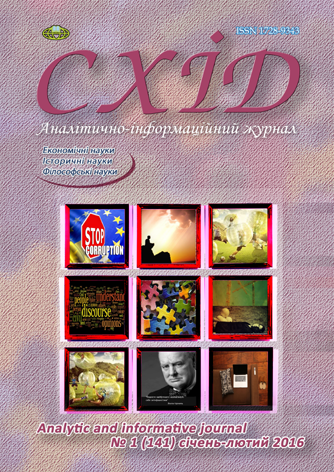Methodological going is near study of financial сontrolling in market economy
DOI:
https://doi.org/10.21847/1728-9343.2016.1(141).64283Keywords:
financial controlling, strategic controlling, operative (tactical) controlling, research methodology, controlling systemAbstract
Certainly and the theoretical and practical aspects of study of financial controlling are analyzed in a market economy. Methodical basis of this research is made by the scientific dialectical method of cognition, at which a research object is studied as a dynamic system in the process of the development. Forming of basic structural blocks, which make the certain stages of research of financial controlling in a market economy on the basis of dialectical, historical and system methods. In the process of study and generalization of scientifically-practical developments the methods of comparison, analysis and synthesis, induction and deduction are applied. Research is based also on normatively legal and economic documents, developments of research establishments and scientists-economists.
Economic essence of category is formed "financial controlling" in a market economy. Yes, it is interpreted as a system of financial management development of subjects of entrepreneurial activity in direction of prognostication and planning of mechanisms and instruments of achievement of the proof financial state.
Except for it, it is set that directions of evolution of theory of financial controlling are based on the improvement of two his basic kinds, namely: strategic; operative (tactical).
The scientific novelty of the got results consists in an exposure, ground and analysis of basic structural blocks which make the certain stages of research of forming and development of financial controlling in a market economy in the context of integration of Ukraine in outer economic space (change of priorities and constituents of development of different spheres of public activity).
The got results of research are subsoil for a study and practical decision of problem of forming of the effective controlling system of subjects of ménage all spheres of public activity on the whole. This approach foresees, above all things, effective and complex development of all forms and types of the resource providing of controlling services with their constituents (labour, material and technical, money and other resources).Downloads
References
Blank I. A. (1999), Bases of financial management, Nika-Center,Kiev, pp. 592 (rus).
Vang Sh. (2008), Displays of controlling in NR China, Controlling in business: theory and practice. Forming of market economy, collection of scientific labours, KNEU, Kyiv, pp. 20-25 (ukr).
DavydovychI.Ye. (2008), Controlling, train aid, Center of educational literature, Kyiv, 552 p. (ukr).
Kovalev D. V. (2008), Determination of jurisdictions of comptroller with the use of matrix of RSMM, Forming of market economy, collection of scientific labours, KNEU, Kyiv, pp. 214-216 (rus).
Anankina Ye. A., Danilochkin S. V., Danilochkina N. G. (1998), Controlling as an instrument of management an enterprise, Audit, YUNITI, Moscow, 279 p. (rus).
Tereshchenko O. O., Babiak N. D. (2013), Financial controlling, train aid, KNEU, Kyiv, 407 p. (ukr).
Ukraineis in numbers 2014: Statistical Yearbook (2015), State Statistics Service, Kyiv, 239 p. (ukr).
Falko S. G. (2008), Controlling for leaders and specialists, Finances and statistics,Moscow, 272 p. (rus).
Podderohin A. M., Bilyk M. D., Buriak L. D. (2004), Finances of enterprises, KNEU, Kyiv, 546 p. (ukr).
Hilton R. W. (2002), Managerial Accounting,5. A.,New York, 526 p. (eng).
Horváth P. (1994), Controlling, 5 Aufl., München, 441 p. (germ).
Reichmann T. (1990), Controlling mit Kennzahlen, 2 Aufl., Vahlen Verlag, München, 384 p. (germ).
Serfling K. (1992), Controlling, 2 Aufl., Kohlhammer, Stuttgart, Berlin, Köln, 360 p. (germ).
Weber J. (1993), Logistik-Controlling, 3. Aufl., Stuttgart, 743 p. (germ).
Downloads
Published
How to Cite
Issue
Section
License
Copyright (c) 2016 Oleg Klokar

This work is licensed under a Creative Commons Attribution-NonCommercial-NoDerivatives 4.0 International License.
1. Authors bear responsibility for the accuracy of facts, quotations, numbers and names used.
2. Manuscripts are not sent back.
3. The publisher does not always agree with the authors' opinion.
4. The authors reserve the right to authorship of the work and pass the first publication right of this work to the journal under the terms of a Creative Commons Attribution-NonCommercial-NoDerivatives 4.0 International License. This license allows others to distribute (copy) the published work for non-commercial purposes, provided there is mandatory attribution to its authors and a link to the first publication in our journal.
5. The authors have the right to conclude separate supplement agreements that relate to non-exclusive work distribution in the form in which it has been published by the journal (for example, to upload the work to the online storage of the journal or publish it as part of a monograph), provided that the reference to the first publication of the work in this journal is included.

